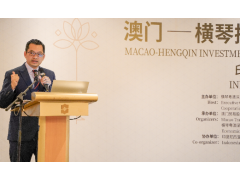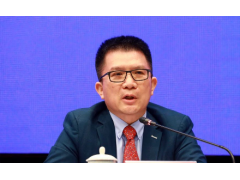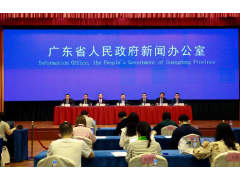"The management mode of the Guangdong-Macao In-depth Cooperation zone is unprecedented. We face new challenges every day. I have learned a lot over the past year," said Nie Xinping, director of the Hengqin Office of the Guangdong Provincial People's Government and deputy director of the Executive Committee of the Guangdong-Macao In-Depth Cooperation Zone in Hengqin, when accepting an interview with Nanfang Daily and GD Today on September 13.
Last September, China issued a general plan for building a Guangdong-Macao in-depth cooperation zone in Hengqin. Later, the administrative organizations of the Zone were inaugurated. Over the past 12 months, great efforts have been made to promote the integrated development of Hengqin and Macao.
"It is the deep cooperation between Guangdong and Macao that makes the Zone special." In Nie's view, Macao boasts advantages of being a free trade port, while the mainland possesses abundant resources and talent, a huge market, and high efficiency. For the Zone's further development, "we will stick to making the most of both sides’ advantages in the future," Nie stated.
Institutional innovation and rule docking are important tasks
According to Nie, the Zone is where domestic and international circulations meet, and where salt and fresh water meet. It has great possibilities for institutional innovation and rule docking under the Guangdong-Macao cooperation.
Progress has been made in terms of personnel exchange, cross-border financial innovation, market access, law services, etc. Just from this September, a visa facilitation policy for eligible foreigners in Macao to visit Hengqin officially comes into effect.
As for modern finance, Hengqin has attracted 27 "Qualified Foreign Limited Partner (QFLP)" enterprises to settle down since the pilot plan was initiated last December.
In an attempt to optimize its business environment and offer high-quality cross-border taxation services for Macao enterprises and residents, the place has set up to the first tax cooperation office between Portuguese-speaking regions and the Chinese mainland.
Nie indicated that more minor reforms, technological support and flexible measures will be implemented in accordance with the needs of Macao residents and enterprises to develop in the Zone. "We aim to accomplish over 100 affairs for advancing rule docking in the next three years."
Special funds created for international talent
Nie emphasized talent's role in boosting innovation and developing the four major industries: technological research and development and high-end manufacturing; Chinese medicine and other Macao-branded industries; cultural tourism, exhibition and trade; and modern finance.
"It is one of our goals to attract more Macao residents to work and live in Hengqin. Therefore, we will push forward the industries' substantial operation, thus creating high-quality jobs for Macao residents, especially Macao youths."
Since last year, more than 400 targeted recruiting plans have been rolled out by the Zone for Macao residents. A cross-border project targeting international talent has been also started, in which qualified personnel are encouraged to do research in Macao and commercialize their scientific results in the Zone.
Nie revealed that more talent programs are on the way. "We will formulate talent policies, establish special funds regarding innovation and entrepreneurship for overseas talent. For those willing to settle down in Macao, settling-in allowance, landing fee and research start-up funds will be available."





